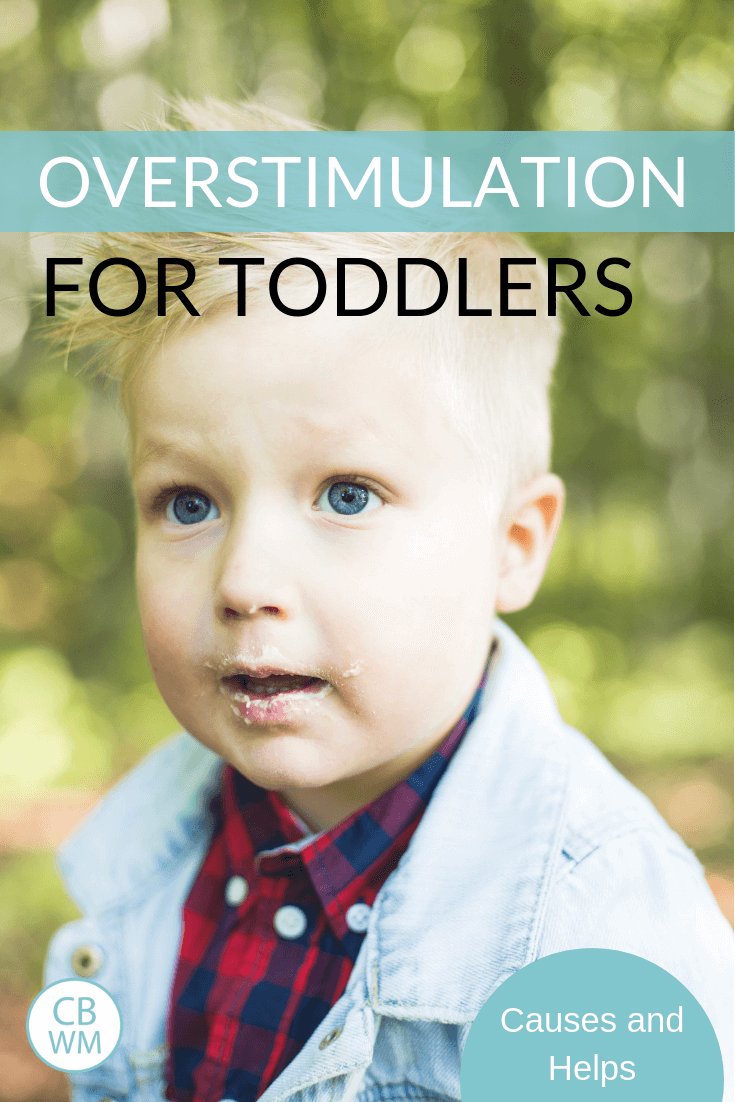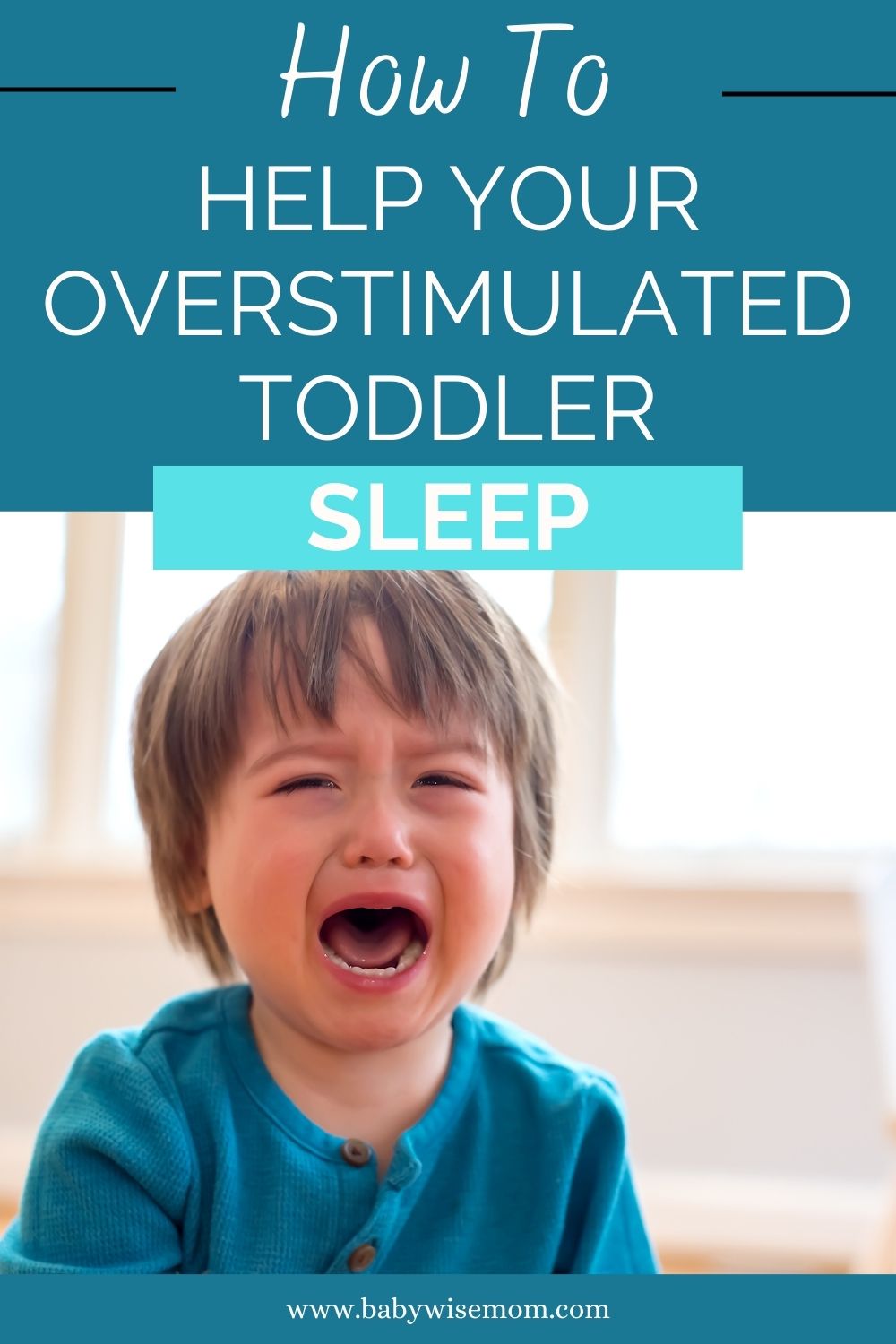Overstimulation for Toddlers. Causes of overstimulation, what overstimulation looks like, and how to calm an overstimulated toddler. Avoid sensory overload.

It isn’t only babies who can get overstimulated (see How to Calm Your Overstimulated Baby for more information on this topic). Toddlers on up to adults can become overstimulated.
Think of the nights you have stayed up later than usual and have a hard time falling asleep, or nights you watched a movie that really interested you and made it harder to fall asleep. We all can become overstimulated.
The toddler can handle more information than the baby. For the baby, everything is a new sensation. Toddlers are still taking in a lot of new sights, sounds, smells, etc., but they can handle more than the baby can.
Toddlers have the ability to defend themselves from overstimulation. The toddler can wiggle out of his great-aunt’s arms when she has become too much for him. He can go find a quiet room to play in when the large crowd assembled is just too noisy for him.
Overstimulated toddlers can have crankiness, bounce off the walls, and not sleep well. Even though toddlers have more control than a baby, as parents, we need to be aware of signs of overstimulation so we can help our overstimulated child and avoid a meltdown.
Post Contents
- Causes of Overstimulation for Toddlers
- How to Recognize Overstimulation in Toddlers
- How to Help an Overstimulated Toddler
- Overstimulated Toddler Frequently Asked Questions
- Is Overstimulation in Toddlers Normal?
- What Happens When You Overstimulate a Toddler?
- What Causes Overstimulation in Toddlers?
- What are the Symptoms of Overstimulation?
- How Can I Help My Ovestimulated Toddler Sleep?
- Conclusion
- Related Posts:
Causes of Overstimulation for Toddlers
Here are some common causes of overstimulation in the toddler. You will find the list to be similar to that of the baby:
Too Little Sleep: Maybe your toddler got to bed the night before because you were at a family party. Perhaps his one nap of the day was cut short because you had a doctor appointment that cut into it. These things happen, but they do cause your toddler to become overstimulated. He can’t handle as much when he is overly tired.
Too Much Activity: The holiday parties, family reunions, etc. can cause your toddler to become overstimulated. There is so much stimulation at these activities! There is so much noise. There is so much to see. There are so many people. It can really stress the brain out and even cause some anxiety in your little one.
Routine Disrupted: This is not only naps and mealtimes, but regular activities like independent playtime. Again, disruption to routine is a part of life, but it is a cause of overtimulation for your toddler.
One thing to take note of, all people have different levels of tolerance with disruption, including toddlers. If your toddler is a highly sensitive person, he will not handle less sleep, too much activity and noise, or the routine disrupted with less grace than a toddler who is not as sensitive of a person.
The amount of stimulation your toddler can handle will be different than your sister’s toddler.
How to Recognize Overstimulation in Toddlers
So what does overstimulation look like for the toddler? Well, it isn’t pretty. The overstimulated baby cries and has a hard time falling asleep. Most people take pity on overstimulated newborns and think he just looks so cute when his lip quivers like that.
The toddler doesn’t receive the same sympathy, and many disapproving looks can be cast on the parents as people assume the parent has raised a spoiled brat.
Most -wise children who are overstimulated act “normal” to the world, so much of the disappointment is felt by the parents since that is not how their little angel usually behaves. Here are some signs your toddler is overstimulated:
Obedience Dwindles: The other night we took dinner to some friends who just had a baby. At first both children were polite and well behaved. As the night progressed, the obedience digressed, especially in Kaitlyn (20 months) since she is less able to handle being overly tired than Brayden (3.5 years). I didn’t realize the time. When we got out to the car, I saw that it was 30 minutes past Kaitlyn’s bedtime. No wonder she had stopped listening. Toddlerwise talks about these situations and says, “It is not discipline that the child needs, but rest” (page 103). For some kids, it is as simple as not obeying as well as usual. For others, a tantrum is the symptom of this problem.
Irrationality Appears: Your toddler can become very irrational. Rules are no longer acceptable. He will not wait for what he wants. The normal expectations of parents suddenly seem very unreasonable. Your kiddo will be very out-of-character.
Crying Reigns: Your child might cry. Crying usually accompanies a tantrum, but some will just cry. Irritability will increase as will sensitivity.
Manners Depart: This is more obvious in the older toddler than the younger one; younger toddlers don’t really have manners yet (though they might forget their please and thank yous). For Brayden, this can be a lack of hugs and kisses when departing from the grandparents or refusal to answer the questions of adults.
Aggression Emerges: You may find your toddler using her fists to hit things–even you!

How to Help an Overstimulated Toddler
There are some things you can do to minimize the impact of these disruptions. You don’t have to be as drastic as you did with your baby, but there are some strategies you can follow.
Adjust Your Expectations: Prepare yourself with an extra measure of understanding and patience for your child. As stated above, this is not the time for discipline but for remedying the cause of the problem.
The cause is being overly tired or overstimulated. When he doesn’t respond to your instruction, patiently help him to do what is needed rather than getting flustered that he isn’t listening to you.
You need to carry this extra patience with you beyond just the day of disruption; give your toddler time to get back on track. If you have been traveling or had to skip nap for a day or two, expect a few days or even a week to get things back to normal after the chaos.
Maintain Routine As Possible: When Brayden was younger, independent play was very important to his overall level of obedience that day. I would try to have independent play before we went to visit people. This wasn’t always possible, but I did it when I could.
Sometimes when we are at a family party, he would remove himself from the large gathering to a room alone. I allowed him to do this and have his time to himself.
Often in these family party situations, we let our toddler wander at will. This is a prime opportunity for our toddler to get into mischief, so keeping some structure as possible will prevent discipline issues.
So if you see your toddler is getting overstimulated, find a calm space for your toddler to go to and be alone. You might play some soft music or even run a sound machine to help block out noise.
Maintain Sleep as Possible: While a todler can typically now skip a nap while out, you might need to try to work a nap in. When Kaitlyn was a toddler, I would take her pack and play and put her where I could. She would usually get a shorter nap than usual, but it is better than nothing.
You can take a white noise machine to help block out the noise.
Maintain Meals: It seems our family meals are always around 1 PM, which was 1.5 hours past the normal lunch time for our kids. I would either just feed them lunch at the normal time or give them at least a snack to hold them over. This worked out because children often don’t eat as well when there are a lot of things to do and people to see.
Have Breaks: I always try to have breaks between days of disruption. This isn’t always possible, but I make every effort. So if Sunday is going to be disrupted, then on Saturday I keep naps, bedtime, meals, and other play activities consistent. I will do the same for Monday, watching for possible need of longer naps or earlier bedtime.

Overstimulated Toddler Frequently Asked Questions
Here are some frequently asked questions about an overstimulated toddler.
Is Overstimulation in Toddlers Normal?
It is normal for a toddler to get overstimulated if naps are missed, bedtime is late, or there are a lot of activities going on away from home.
It isn’t normal for a toddler to be in a constant state of overstimulation.
What Happens When You Overstimulate a Toddler?
Overstimulated, or overwhelmed, toddlers will often get hyper, aggressive, and very emotional. They often will not sleep well.
What Causes Overstimulation in Toddlers?
Overstimulation happens when your child has more noise, activity, and experience than she can handle. This can happen with a lot of activity and/or lack of sleep.
Sleep helps your body reset and rejuvenate, so if there is no sleep, then there is no rejuvenation.
Overstimulation often happens when you travel or leave your house for an event and disrupt your toddler’s typical routine.
What are the Symptoms of Overstimulation?
There are many symptoms of overstimulation. They include:
- Struggle sleeping
- Grumpiness, irritability, or agitation
- Stress
- Inability to focus
- Easily overwhelmed
How Can I Help My Ovestimulated Toddler Sleep?
It is stressful if your toddler has been overstimulated and is struggling to sleep. There are things you can do to help.
You might need an earlier bedtime than usual. Try putting your toddler to bed 30-60 minutes early. You might also need to let your toddler sleep in the next morning.
You might want to let naps be a little longer for a day or two and might even need to have the nap start earlier than usual.
A sound machine or weighted blanket might help if your toddler does not typically sleep with those, as will making the room darker.
Your toddler might need help relaxing and settling. Keep your typical bedtime routine, but you might need to take extra care to make sure the setting is calming. You might need to hold your toddler or rock for a bit to help her calm, but this will stimulate some even more, so follow your child’s cues.
Conclusion
You know your child best. If your child does not do well with too much stimulation or with less sleep, find a balance between respecting what your child needs and asking your child to face these situations. If you have a sensitive child, your child won’t be a toddler forever. Your child will naturally need less sleep as she gets older. She will gain coping skills with large crowds as she gets older. Protect her stimulation levels as is reasonable. Help her cope when you have to allow her to be in a situation where she will be overstimulated.
Related Posts:
- Dealing With Disruptions To Your Routine
- Let Your Schedule Serve You, You Don’t Serve Your Schedule
- How to Calm Your Overstimulated Baby

This post originally appeared on this blog in December 2008
